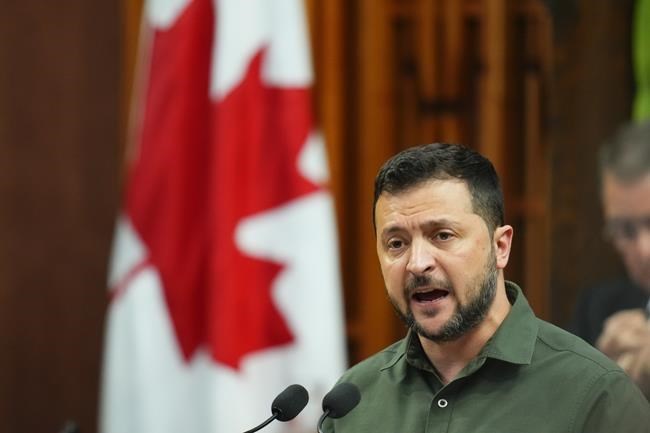OTTAWA — Ukrainian President Volodymyr Zelenskyy ended his historic wartime address to Canada's House of Commons with an Inuktitut message of inspiration and reliance that he learned from the Governor General.
Gov. Gen. Mary Simon welcomed Zelenskyy to Rideau Hall Friday morning before his address to Parliament, where she taught him an Inuktitut word she has shared with other world leaders, Indigenous communities and Canadian children alike.
"She taught me a word from her mother tongue," Zelenskyy told members of Parliament and others who gathered to hear him speak in the House of Commons Friday.
"Ajuinnata. She said the meaning of this word is: don't give up. Don't give up, stay strong against all odds."
Zelenskyy gave the address as part of his first official visit to Canada since Russian troops began a full-scale assault on Ukraine in February 2022. He arrived after recent meetings in Washington, as part of an effort to ensure allies remain steadfast in their commitment to provide military and other forms of aid to his embattled country.
Simon, who grew up in the Nunavik region of northern Quebec, was prevented from speaking her mother tongue of Inuktitut when attending a federal government day school as a child, where she spoke English and was denied the chance to learn French.
Canada's first Indigenous person to hold her viceregal position, Simon has referred to the Inuit concept of ajuinnata countless times since she took on the job in 2021.
She shared the word with Queen Elizabeth II last year at a visit to Windsor Castle. She also used the word in praise of Indigenous delegates in the face of the apology from Pope Francis for the role of the Roman Catholic Church in the Canadian residential school system.
The term also applies to Zelenskyy and his country, Simon's office said in a statement Friday.
Simon's office says the word, one the Governor General heard from her elders while growing up and finds especially meaningful, means to "persevere" or "never give up."
"The people of Ukraine have demonstrated ajuinnata through their steadfast and ongoing fight for their freedom, in the face of Russia's unjustified, full-scale invasion of Ukraine," the statement read.
Zelenskyy and Simon sat side by side in matching arm chairs as she explained the meaning of the word. He wore his familiar olive-green fatigues while she wore a maroon scarf adorned with colourful flowers draped over her shoulders.
The floral scarf — called a kokum scarf — is a traditional accessory for some Indigenous Peoples and part of powwow regalia.
Similar scarves have come to represent solidarity between Indigenous Peoples and people from Ukraine, in a tradition that dates back to Ukrainians' early migration to Canada.
In the late 19th century, Ukrainian immigrants in the Prairies established trading relationships with Indigenous Peoples and offered hustkas, also known as babushkas, or grandmother, scarves.
Kokum is the word for grandmother in Cree.
Social media campaigns last year saw Indigenous Peoples wearing their kokum scarves along with messages of support for the country at war.
Zelenskyy ended his address in the House of Commons by wishing Canada and Ukraine ajuinnata, before the chamber erupted in a standing ovation.
"Ajuinnata Canada. Ajuinnata Ukraine."
This report by The Canadian Press was first published Sept. 22, 2023.
Laura Osman and Alessia Passafiume, The Canadian Press



